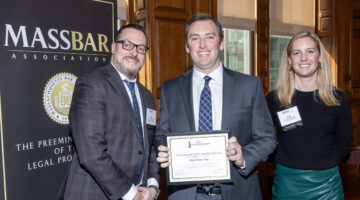The federal government does not have legal authority to prohibit private-sector businesses from engaging in lawful Diversity, Equity, Inclusion and Accessibility practices, or mandate their removal.
On January 21, 2025, the White House published Executive Order 14173, titled “Ending Illegal Discrimination and Restoring Merit Based Opportunity,”[1] which left many employers in a state of confusion regarding their own Diversity, Equity, Inclusion, and Accessibility (DEIA) policies. In response to this confusion, the Attorneys General of Massachusetts, Illinois, Arizona, California, Connecticut, Delaware, Hawaii, Maine, Maryland, Minnesota, Nevada, New Jersey, New York, Oregon, Rhode Island, and Vermont issued the “Multi-State Guidance Concerning Diversity, Equity, Inclusion, and Accessibility Employment Initiatives.”[2]
In sum, the Attorneys General have made it clear that Executive Order 14173 does not prohibit private-sector employers in these states from implementing or maintaining DEIA initiatives and programs that are otherwise lawful.
Which DEIA practices are unlawful?
Executive Order 14173 orders all federal agencies “to combat illegal private-sector DEI preferences, mandates, policies, programs, and activities.” The use of the term “DEI” here may lead employers to question whether all of their programs that promote diversity, equity, and inclusion will be subject to this edict. The Multi-State Guidance makes it clear that this is not the case. “Illegal DEI preferences” does not refer to all DEIA programs, claims the Attorneys General, but is limited to discriminatory hiring and promotion practices based on protected characteristics (race, gender, national origin, disability, etc.), which have already been found to be illegal under both federal and state law. These discriminatory practices have been historically prohibited under Title VII of the Civil Rights Act of 1964 and the Americans with Disabilities Act, as well as under more expansive state laws aimed at prohibiting employers from discriminating against employees, taking actions which have adverse impacts of protected groups, and creating hostile workplaces through harassment of employees. So long as private-sector employers are not engaging in these discriminatory practices, otherwise lawful DEIA programs will not be affected by Executive Order 14173. If an employer is unsure whether their DEIA programs will be impacted, they should consult a trusted employment attorney.
Why are DEIA programs important?
The Multi-State Guidance urges employers to continue engaging in DEIA initiatives, particularly to limit exposure to liability from workplace discrimination claims. Employment discrimination claims are one of the most prevalent lawsuits that employers face.
The Attorneys General urge employers to implement and maintain initiatives that will ensure the promotion of diverse perspectives in the workplace. In addition to the financial benefits of promoting diversity in the workplace[3], whether a company has implemented anti-discrimination and equal employment policies, trainings, and procedures are factors that state agencies and courts will review in determining whether an employer is liable for alleged discriminatory conduct when a workplace discrimination claim is brought.
What are best practices for Massachusetts employers?
Massachusetts employers should ensure that their hiring and recruitment programs are tailored to attract candidates from a broad range of backgrounds. The Attorneys General also advise employers to conduct hiring and promotion interviews using a panel of evaluators to limit bias and set objective criteria based on skill or experience in their evaluation of employees.
To limit liability for discriminatory conduct, employers should also ensure that all employees have equivalent access to professional development opportunities, implement procedures for reasonable workplace accommodations, and conduct trainings on DEIA-based topics.
Finally, the Attorneys General urge employers to implement procedures to evaluate and ensure that their DEIA policies and programs are working successfully, and to create mechanisms for employees to report inappropriate or discriminatory conduct, as well as to provide feedback regarding their experiences in the workplace. Employers would benefit from engaging an employment attorney to review their current DEIA policies to ensure that they do not face exposure to a workplace discrimination suit.
Will Executive Order 14173 be challenged in court?
On February 21, 2025, the United States District Court for the District of Maryland issued a national preliminary injunction[4] blocking specific provisions of Executive Order 14173. The injunction prohibits the administration from bringing any enforcement action which resulted from the Executive Order’s mandate that the Attorney General must take “appropriate measures to encourage the private sector to end illegal discrimination and preferences, including DEI.”
Additionally, the federal court highlighted that the terms “DEI” and Illegal DEI and DEI policies” are not defined, leading to confusion in the private sector as to which DEIA initiatives will be considered illegal under the Executive Order. Employers should be vigilant and consult a trusted attorney, if necessary, as this case unfolds.
Thomas J. Gallitano, Kathleen R. O’Toole, and Daniel Walsh-Rogalski are Employment attorneys at the Boston-based law firm Conn Kavanaugh Rosenthal Peisch & Ford, LLP.
They can be reached, respectively, at tgallitano@connkavanaugh.com, kotoole@connkavanaugh.com, and dwalsh-rogalski@connkavanaugh.com
[1] See “Ending Illegal Discrimination and Restoring Merit Based Opportunity,” available at https://www.whitehouse.gov/presidential-actions/2025/01/ending-illegal-discrimination-and-restoring-merit-based-opportunity/
[2] See “Multi-State Guidance Concerning Diversity, Equity, Inclusion, and Accessibility Employment Initiatives,” available at https://www.mass.gov/doc/multi-state-guidance-concerning-diversity-equity-inclusion-and-accessibility-employment-initiatives/download
[3] The Attorneys General cite to a McKinsey & Company study, Diversity Wins: How Inclusion Matters, May 19, 2020, https://www.mckinsey.com/featured-insights/diversity-and-inclusion/diversity-wins-how-inclusion-matters, which states that companies in the top quartile for diversity outperformed those in the bottom quartile “by 36% in profitability.”
[4] See National Association of Diversity Officers in Higher Education, et al. v. Donald J. Trump, et al., No. 1:25-cv-00333, (D. Md. 2025).
Share with your network:

